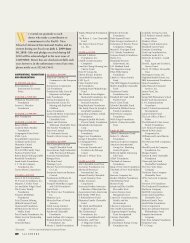Download Current Issue - SAIS
Download Current Issue - SAIS
Download Current Issue - SAIS
You also want an ePaper? Increase the reach of your titles
YUMPU automatically turns print PDFs into web optimized ePapers that Google loves.
But the 21st century has since delivered<br />
good news, with an average growth rate<br />
of 7.6 percent from 2003 to 2009, even<br />
in the shadow of the largest sovereign<br />
default in history and a political leadership<br />
capable of unpleasant little tricks<br />
such as falsifying inflation figures and<br />
nationalizing pension funds to get at<br />
peoples’ savings.<br />
The fundamental reason for Argentina’s<br />
impressive rise from the ashes<br />
has been spectacular Asian demand for<br />
commodities, most of all soy. Simply,<br />
the country is back where it was at the<br />
turn of the last century, reaping magnificent<br />
profits by supplying the industrial<br />
world with food. As the Financial Times<br />
explained in a wonderful headline,<br />
“Argentina Is to Import South Korea<br />
Cars for Peanuts.”<br />
The Profit Picture<br />
What are the implications of high food<br />
prices for the development strategies of<br />
“peripheral” countries? It is important<br />
to recognize that there is good news.<br />
Although high food prices have certainly<br />
set off riots and reduced incomes<br />
in real terms, these countries are not<br />
just consumers. A half century ago,<br />
the protest was that low food prices<br />
systematically disadvantaged peripheral<br />
countries, and more recently we have<br />
witnessed bitter and justifiable objections<br />
that Western agricultural subsidies<br />
price the developing world’s farmers out<br />
of the market. What is it to be? Is there<br />
any price for agricultural goods that is<br />
not a threat to developing countries? We<br />
need to recognize that rising prices are a<br />
sign of extra demand, which is good for<br />
producers, many of whom are or could<br />
be in developing countries.<br />
There are also, however, two important<br />
problems with growth based on<br />
agricultural products. The first and<br />
simplest is that monoculture economies<br />
are vulnerable to shocks, which<br />
may also have ruinous political consequences,<br />
as Côte d’Ivoire has shown<br />
in its fall from breadbasket to basket<br />
case, which began in the 1980s with a<br />
crash in cocoa prices. The second is the<br />
connection between agriculture and<br />
inequality. If a Jeffersonian model of<br />
yeomen farmers is viable, this need not<br />
be the case. But if economies of scale—<br />
or crude power politics—dominate, we<br />
should expect rising agricultural prices<br />
to enrich a small land-owning minority.<br />
Why should capital get the rewards and<br />
not labor? As economist Arthur Lewis<br />
long ago explained, the reserve army of<br />
labor waiting in rural areas has a marginal<br />
productivity close to zero, which<br />
helps explain why so many people<br />
have flocked to cities. The combination<br />
of unevenly distributed land with<br />
plentiful labor and high food prices<br />
will drive inequality to extremes—just<br />
the mechanism the economic historian<br />
John Coatsworth used to explain the<br />
19th-century origins of high inequality<br />
in Latin America.<br />
We have returned to the world of<br />
the late 19th century, where growing<br />
food for export to industrial countries<br />
is a highly profitable endeavor. The<br />
intervening century has been marked<br />
by disdain for agriculture and a passion<br />
for industry, with results ranging from<br />
the heroic (South Korea) to the farcical<br />
(Nigeria). But perhaps figuring out the<br />
best way to industrialize is no longer<br />
the philosopher’s stone of development<br />
studies. Were a great dissident economist<br />
like Raúl Prebisch to be reborn, he<br />
would surely champion comparative<br />
advantage and agriculture—a mix that<br />
is once again working for his homeland,<br />
Argentina. n<br />
David Fowkes is a Ph.D. candidate in the<br />
African Studies Program and an instructor<br />
of comparative politics at <strong>SAIS</strong>.<br />
2011–2012 27



